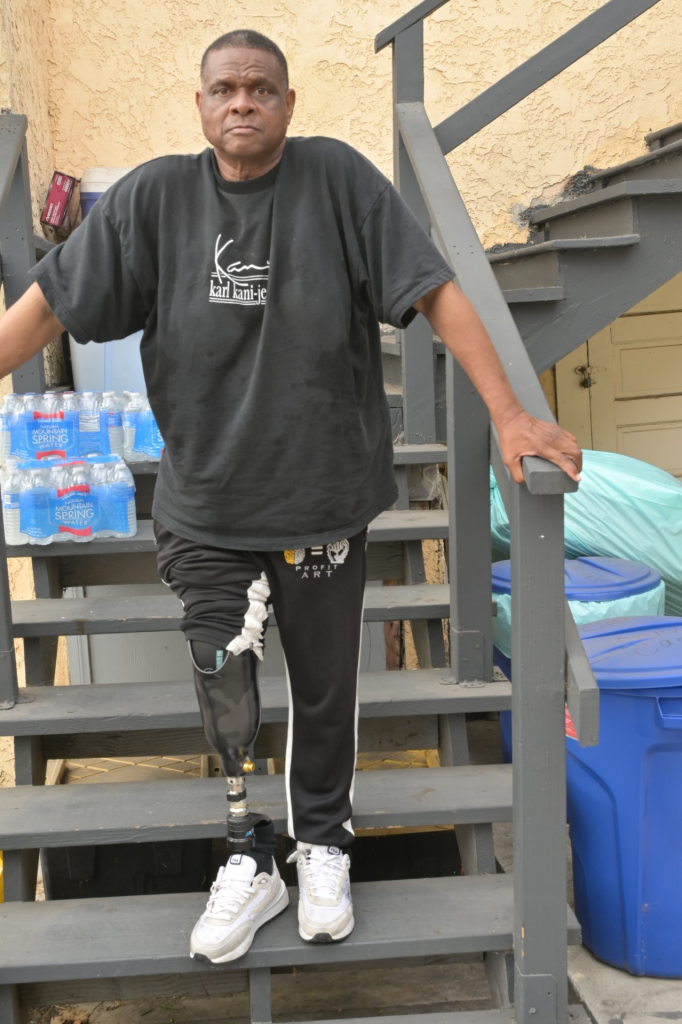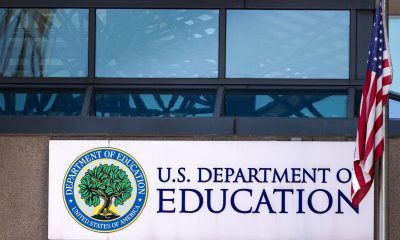Advice
Laney Offers “Fall Is Free” – Free Tuition, Free Textbooks, Free Lunch and More for the Fall 2022 Semester
“Laney College is thrilled to offer a ‘Free Fall’ to most of our students. Now more than ever, we must recognize that college costs that go beyond tuition represent barriers to success for so many students, whether they are working adults attending part-time or high school graduates. This fall is about not only opportunity but putting students in the best position possible to reach their goals with our support,” said Rudy Besikof, president of Laney College.

Laney College is offering new and continuing students the “Fall is Free” program for those who complete the FAFSA (Free Application for Federal Student Aid) application or the California Dream Act application, and there are no minimum or maximum units required.
Students can take any of the college’s 130 programs along with in-person, hybrid or online classes. International students are not eligible for the program. In addition to free tuition, the program covers textbook costs and the college’s student health fees. Students will also receive free bus passes, free lunch on campus, free weekly produce boxes and Chromebooks and wifi hotspots to check out from the library.
“Laney College is thrilled to offer a ‘Free Fall’ to most of our students. Now more than ever, we must recognize that college costs that go beyond tuition represent barriers to success for so many students, whether they are working adults attending part-time or high school graduates. This fall is about not only opportunity but putting students in the best position possible to reach their goals with our support,” said Rudy Besikof, president of Laney College.
The Areas of Interest and the Pathways for Success Mapper is offered by Laney College to assist with associate degrees, certificates and associate degrees for transfer, which guarantee admission into a California State University.
This fall there are over 600 classes to choose from, including short-term, late-start and weekend courses. With a rich history in the trades, Laney College offers access to internships, cutting-edge training and ties to local industry that culminate in high-paying jobs.
The college’s rich history in the community dates back to 1927, and the student body’s diversity is a point of pride. With the uncertainty brought about by the COVID-19 pandemic, Laney College’s Fall is Free program offers students an opportunity to finish what they started or begin a new, exciting goal — with support.
For more information, students can visit the college’s Welcome Center, visit the Fall is Free website or call the Fall is Free Helpdesk at (510) 255-3507, open from 9-11 a.m. and 1-5 p.m. on Monday, Wednesday and Thursday; 3-6 p.m. on Tuesday. Laney will be hosting information sessions for students August 10, 11, 12, 15 and 16 at 12 p.m. with additional evening sessions at 6 p.m. on August 10 and 11. Students can also access the online FAQ. #AnythingIsPossible For more information, to schedule an interview/campus visit please contact: Larena Baldazo, Laney College Public Information Officer (925) 565-8477 Eleni Gastis, Guided Pathways Co-Coordinator (510) 228-8511.
Activism
Essay: Intentional Self Care and Community Connections Can Improve Our Wellbeing
At the deepest and also most expansive level of reality, we are all part of the same being, our bodies made from the minerals of the earth, our spirits infused by the spiritual breath that animates the universe. Willingness to move more deeply into fear and pain is the first step toward moving into a larger consciousness. Willingness to move beyond the delusion of our separateness can show us new ways of working and living together.

By Dr. Lorraine Bonner, Special to California Black Media Partners
I went to a medical school that was steeped in the principles of classical Western medicine. However, I also learned mindfulness meditation during that time, which opened me to the multifaceted relationship between illnesses and the interconnecting environmental, mental and emotional realities that can impact an individual’s health.
Therefore, when I began to practice medicine, I also pursued training in hypnosis, relaxation techniques, meditation, and guided imagery, to bring a mind-body focus to my work in medical care and prevention.
The people I saw in my practice had a mix of problems, including high blood pressure, diabetes, and a variety of pain issues. I taught almost everyone relaxation breathing and made some general relaxation tapes. To anyone willing, I offered guided imagery.
“My work embraced an approach to wellness I call “Liberatory Health” — one that not only addresses the treatment and management of disease symptoms but also seeks to dismantle the conditions that make people sick in the first place.”
From my perspective, illness is only the outermost manifestation of our efforts to cope, often fueled by addictions such as sugar, tobacco, or alcohol, shackled by an individualistic cult belief that we have only ourselves to blame for our suffering.
At the deepest and also most expansive level of reality, we are all part of the same being, our bodies made from the minerals of the earth, our spirits infused by the spiritual breath that animates the universe. Willingness to move more deeply into fear and pain is the first step toward moving into a larger consciousness. Willingness to move beyond the delusion of our separateness can show us new ways of working and living together.
To put these ideas into practical form, I would quote the immortal Mr. Rogers: “Find the helpers.” There are already people in every community working for liberation. Some of them are running for office, others are giving food to those who need it. Some are volunteering in schools, libraries or hospitals. Some are studying liberation movements, or are working in urban or community gardens, or learning to practice restorative and transformative justice, or creating liberation art, music, dance, theater or writing. Some are mentoring high schoolers or apprenticing young people in a trade. There are many places where compassionate humans are finding other humans and working together for a better world.
A more compassionate world is possible, one in which we will all enjoy better health. Creating it will make us healthier, too.
In community, we are strong. Recognizing denial and overcoming the fragmenting effects of spiritual disorder offer us a path to liberation and true health.
Good health and well-being are the collective rights of all people!
About the Author
Dr. Lorraine Bonner is a retired physician. She is also a sculptor who works in clay, exploring issues of trust, trustworthiness and exploitation, as well as visions of a better world.
Activism
Prescribing Prevention: Doctors Turn to Lifestyle, Herbs and Veggies to Protect Against Chronic Illness in Black Californians

By Charlene Muhammad, California Black Media
Leibo Glover received his diabetes diagnosis at the same time he found out he needed a below-the-knee amputation.
“Minor,” thought the 63-year-old.
Glover had been self-medicating a toe injury before seeing the doctor.
But while driving from South Los Angeles to Miami on a family trip, an infection set in.
“I had it but didn’t know,” said Glover. “I was just going to come back to California, but they told me if I had left, I would have come home as a corpse,” Glover told California Black Media (CBM).
A majority of the nearly 3.5 million Californians diagnosed with diabetes have preventable Type 2 diabetes, according to researchers at the UCLA Center for Health Policy Research.
In 2023, diabetes was diagnosed in 1 in 6 adults with the lowest incomes (16.7% at 0–99% of the federal poverty line), compared to 1 in 11 adults with the highest incomes (8.9% at 300% or more of the federal poverty line). Age is a factor, too: more than 1 in 5 older adults age 65 and over (22.3%) had diabetes, about twice the rate of adults age 18–64 (8.6%).
Another study by Health Economics and Evaluation Research (HEER) mapped patients with diabetes in California who had amputations. Researchers found that patients living in low-income ZIP codes were far more likely to have had lower-limb amputations than those in higher-income ZIP codes, essentially identifying amputation “hot spots.”
At the time of Glover’s 2018 diagnosis, he was experiencing housing instability and going through financial hardships. Now, he has more stable housing and he has improved his health through lifestyle changes like eating healthier and getting more sleep.
“If the equipment is right, I can stand on my leg for hours. I can actually run, jump, dance and all of that,” said Glover, who got his diabetes under control, in part, by avoiding carbohydrates and sugars.
As chronic illnesses continue to disproportionately impact Black Californians — often leading to preventable amputations and premature deaths — a growing number of doctors and advocates are expanding their care from just treatment to including prevention. From promoting diet and lifestyle changes to cultivating community farms focused on prevention and wellness like Dr. Bill Releford’s Bloom Ranch in Acton.
Releford, a podiatrist based in Los Angeles started the 250-acre Bloom Ranch in 2023 as part of his strategy for preventive care.
“This is my assignment,” said Releford.
“Bloom Ranch has been a perfect backdrop for me to be creative and to find avant-garde ways to make fresh fruits and vegetables more accessible to food deserts in Los Angeles County,” he stated.
California produces nearly half of the nation’s fruits and vegetables, yet more than 1 in 5 Californians — about 8.8 million people — currently struggle with food insecurity, according to the California Association of Food Banks.
“Studies have shown that 75% of amputations are preventable. And African Americans have the highest amputation rate in the nation,” Releford said.
As such, Releford continued, the mortality rate associated with high-level amputation is 50%, which means “if we had 10 people that all had high level amputations, five of those would be deceased in three years.”

Monday, June 28, 2025. Leibo Glover at his home in Los Angeles, California. The security professional’s leg was amputated below the knee.
Releford’s ranch is the largest Black-owned farm in L.A. County. He plans to partner with UCLA and the Charles R. Drew University of Medicine and Science to develop prescriptive vegetable boxes.
“Certain vegetables and herbs can lower blood pressure naturally, like beets, turnips, dill, basil, garlic and others,” said Releford.
“Hopefully, this will inspire other farmers to take this model and replicate it across other urban areas,” Releford added.
“A lot of studies have shown that gardening has so many health benefits – being in the sun, Vitamin D,” said Releford. “The dirt has a lot of microbes that are good for your immune system. Studies have shown that people who work in the dirt have strong immune systems.”
Gardening can potentially decrease the risk of dementia, enhance cognition, reduce stress, and boost immunity, indicates research by Genoa Barrow of the University of Southern California Center for Health Journalism as part of the 2024 Ethnic Media Collaborative, Healing California.
During a recent picturesque day at Bloom Ranch, families, school children, farmers and members of The Ultimate Book Club 1998, founded by Alina Anderson, sampled and purchased fresh produce while taking photographs.
“This is huge. “All of us have families that could use this information,” said Anderson.
Doctors like Releford, who are committed to tackling the most chronic diseases impacting all their patients utilize peer-to-peer support programs with self-management training led by individuals living with chronic conditions to provide role models and support for patients, according to a recent study by the California Health Care Foundation.
“The unifying feature of these programs is that they seek to build on the strengths, knowledge, and experience that peers can offer,” the report states.
Liz Helms, CEO of the California Chronic Care Coalition, addressed state-backed prevention policy and initiatives.
“It’s in horrible shape. It needs to get so much better, especially in underserved areas, where the Black population has a whole set of different needs,” she said.
Helms, who started advocacy after being denied access to care in the early 1990s, applauded new developments in telehealth. The opportunity to choose between visiting a doctor’s office or placing a phone call makes a difference, especially if there are transportation or distance issues, or if one is too sick, she said.
Fear is one thing people, especially in the Black community, must overcome, emphasized Helms.
“I had to get over my fear of going to the doctor, of not speaking up,” continued Helms, urging patients to “understand the baseline” of their health.
“Don’t let anyone stigmatize you or tell you that you’re not good enough to get care or look down on you. Everyone has a right to good, quality, affordable, timely health care,” said Helms.
To engage Bloom Ranch for preventive care focused on wellbeing and healthy living, call (323) 388-4828 or sign up at Bloomranchofacton.com
Activism
Learning Life’s Lessons
Since his release over five years ago, Richard has committed himself to making a difference, particularly by reaching out to women and families who lack the presence of a father or husband. He knows he cannot undo the years lost behind prison walls, but he is determined to use his past to build a better future for others. His story mirrors that of many who have walked a similar path. Yet, it remains uniquely his own – a testament to the power of change, resilience, and the belief that even from tragedy, something good can emerge.

“California’s three-strike laws gave me 2 life sentences for drug possession. After serving 28 years, mostly in solitary confinement, I am free to lead a movement to get the formerly incarcerated to give back.”
By Richard Johnson
I have written this book in hopes of being able to help others from not traveling down the path that leads to imprisonment or a cemetery. At the very beginning of writing this book, it began as a message to my son Fati Yero Gaidi, who was only two years old at the time that I was given two life sentences in prison for drug possession, under the newly implemented three-strikes-you-out law. The more that I wrote, the book began to evolve beyond its intended purpose for my son; it became something that any and everyone could utilize on their separate journeys through life challenges that we encounter. The book helped me put my thoughts, reasoning, perceptions, and views on display, while opening doors that, for the most part, were closed. The book can be purchased via Amazon. Learning life lessons.
About the Author
By Post staff
Richard “Razor” Johnson, 74, is a man whose life journey is marked by hard-earned wisdom, redemption, and an unshakable commitment to guiding the next generation. Once sentenced to life under California’s Three Strikes Law, he was released through what he calls nothing short of divine intervention. His time behind bars, particularly in Pelican Bay State Prison, gave him a new raw and unfiltered understanding of life’s hardest truths.
With the realization that time is precious and the future is shaped by the lessons we learn, Richard writes with urgency and purpose. His book—a 300-page labor of love—is dedicated to young men who may not have a father to teach them the meaning of life’s most important words. Through definitions filled with wisdom, experience, and deep personal insight, he offers direction to those who find themselves lost, just as he once was.
Since his release over five years ago, Richard has committed himself to making a difference, particularly by reaching out to women and families who lack the presence of a father or husband. He knows he cannot undo the years lost behind prison walls, but he is determined to use his past to build a better future for others. His story mirrors that of many who have walked a similar path. Yet, it remains uniquely his own – a testament to the power of change, resilience, and the belief that even from tragedy, something good can emerge.
His words are not just lessons; they are a call to action. He hopes that by investing in young minds with wisdom and insight, they will be better equipped to navigate life’s trials, learn from their mistakes, and find their path to success. Richard “Razor” Johnson writes not just to be heard, but to help – because he knows firsthand that sometimes guidance can make all the difference.
Post publishers Paul and Gay Cobb visited Johnson in San Quentin and attended his graduation while he was in prison. He became a columnist with the Post News Group and has continued his advocacy for the formerly incarcerated by urging them to “give something back”. Johnson says he will be speaking at prisons, colleges, and media outlets to help organize voter registration and community service projects.
-

 Activism3 weeks ago
Activism3 weeks agoOakland Post: Week of November 12 – 18, 2025
-

 Activism3 weeks ago
Activism3 weeks agoIN MEMORIAM: William ‘Bill’ Patterson, 94
-

 Activism3 weeks ago
Activism3 weeks agoHow Charles R. Drew University Navigated More Than $20 Million in Fed Cuts – Still Prioritizing Students and Community Health
-

 Bay Area3 weeks ago
Bay Area3 weeks agoNo Justice in the Justice System
-

 #NNPA BlackPress3 weeks ago
#NNPA BlackPress3 weeks agoLewis Hamilton set to start LAST in Saturday Night’s Las Vegas Grand Prix
-

 #NNPA BlackPress2 weeks ago
#NNPA BlackPress2 weeks agoBeyoncé and Jay-Z make rare public appearance with Lewis Hamilton at Las Vegas Grand Prix
-

 Activism2 weeks ago
Activism2 weeks agoOakland Post: Week of November 19 – 25, 2025
-

 #NNPA BlackPress3 weeks ago
#NNPA BlackPress3 weeks agoThe Perfumed Hand of Hypocrisy: Trump Hosted Former Terror Suspect While America Condemns a Muslim Mayor
























































